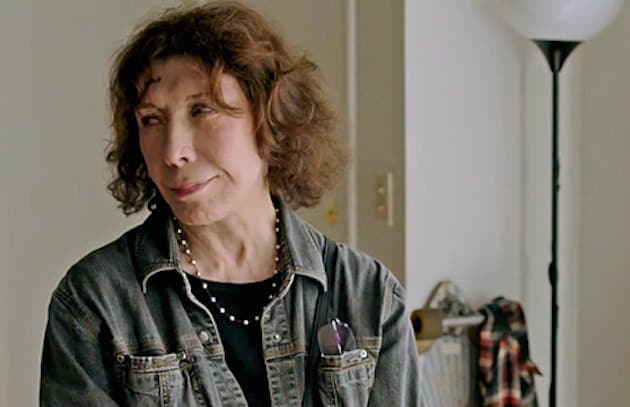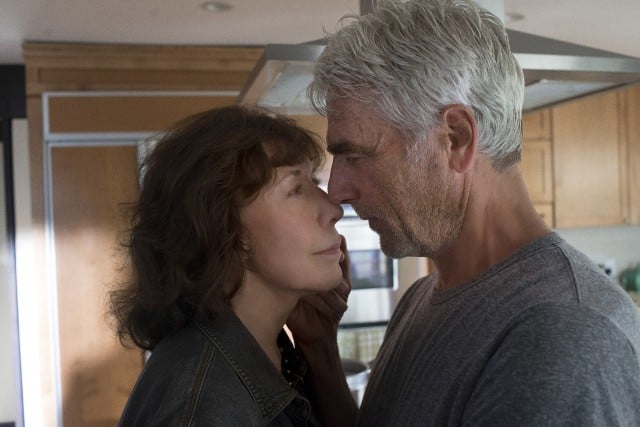
Written and directed by Paul Weitz
USA, 2014
Writer-director Paul Weitz’s comedy-drama Grandma isn’t shy about having modest ambitions. It’s the simple story of the titular Elle (Lily Tomlin) and her pregnant granddaughter Sage (Julia Garner), and the touching arc of their relationship. When the latter comes to the former in search of money for an abortion, the two set off around Los Angeles to find the $630 necessary to pay for the procedure. Soon enough, Grandma becomes a road movie, with Elle taking Sage to meet various former friends, flings, and family members.
More than anything else, the structure allows for a spotlight on the dynamic between Elle and Sage, which works on a personal level as well as on the level of depicting the challenges faced by two women of different generations. At first glance, they couldn’t be more different: Elle is an aging feminist poet and professor who’s just broken up with a girlfriend less than half her age (Judy Greer), and Sage is a sweet but troubled teen trying to find purpose and structure in her life. They’re brought together purely due to their situation, and their initial encounters don’t suggest a further bond. Regardless, the two share the common experience of being mistreated by men too self-absorbed and immature to respect them. As a result, the film has a feminist subtext which is present throughout without ever becoming overt.
The two discover even more of a connection as the film progresses, but it’s too smart and subtle to rely purely on this sort of arc. First of all, the relationship is ornamented by the people they meet along the way: Grandma has an episodic structure, and each episode builds on the one before it without relying on explicit links. They range from the distinctly comic, such as when Elle hits the father of Sage’s baby (Nat Wolff) with a hockey stick, to the sensual, such as when she meets her ex-lover (Sam Elliott), but all of them work to build the picture of the character. The variety leads to the occasional divergence in tone, with bits of slapstick humor which feel like an awkward holdover from Weitz’s American Pie days, but mostly serves to build a complex portrait of a complex woman.
As much as these encounters contribute to the portrayal of Elle, the most important aspect in the character’s development comes from Tomlin herself. She plays old crank and aging erotic lover with equal verve, and the result is a beautiful portrayal of a woman with tremendous depth. Tomlin was underserved by the shallowness of her character on this year’s Netflix sitcom Grace and Franke, and it’s refreshing to see her given a role which allows her to show more of her talents.
The film works best when it focuses most on Elle and less on the various ghosts from her past, as the other characters are introduced too briefly to develop much. This doesn’t always matter, such as in her laugh-out-loud funny riff on “drip coffee” in a café at the expense of a helpless barista (John Cho), but the brevity doesn’t work as well when the others are expected to provide pathos of their own. Falling most flat is the encounter with Sage’s mother, Judy (Marcia Gay Harden), whose treadmill desk and workaholism feel too predictable to bring the character to life. Particularly in the stark contrast with the lacking for structure Elle, her type-A personality feels too ripped from the recent canon of tightly wound female characters to stand out. Mother and daughter are paired as an obvious binary, making her feel all the more like a plot device and less like a person. Harden does what she can to bring the role to life, but the script lacks material for her to work with.
As a result, even at a slight 75 minutes, the film feels too long by about 10. Weitz’s ease with a simple slice-of-life story is respectable, and his constant use of handheld camera gives the movie an intimacy which fits the narrative, but it’s hurt by jarring elements such as Judy who disrupt the tone.
Still, the story belongs to Elle and Sage (but really Elle, thanks to Tomlin), and Grandma works beautifully when it stays focused on the two. The road movie format is perfect for showcasing their relationship, and its feminist undertones make it work all the more. Weitz doesn’t try to do too much with Grandma, and it suits the film just fine.


